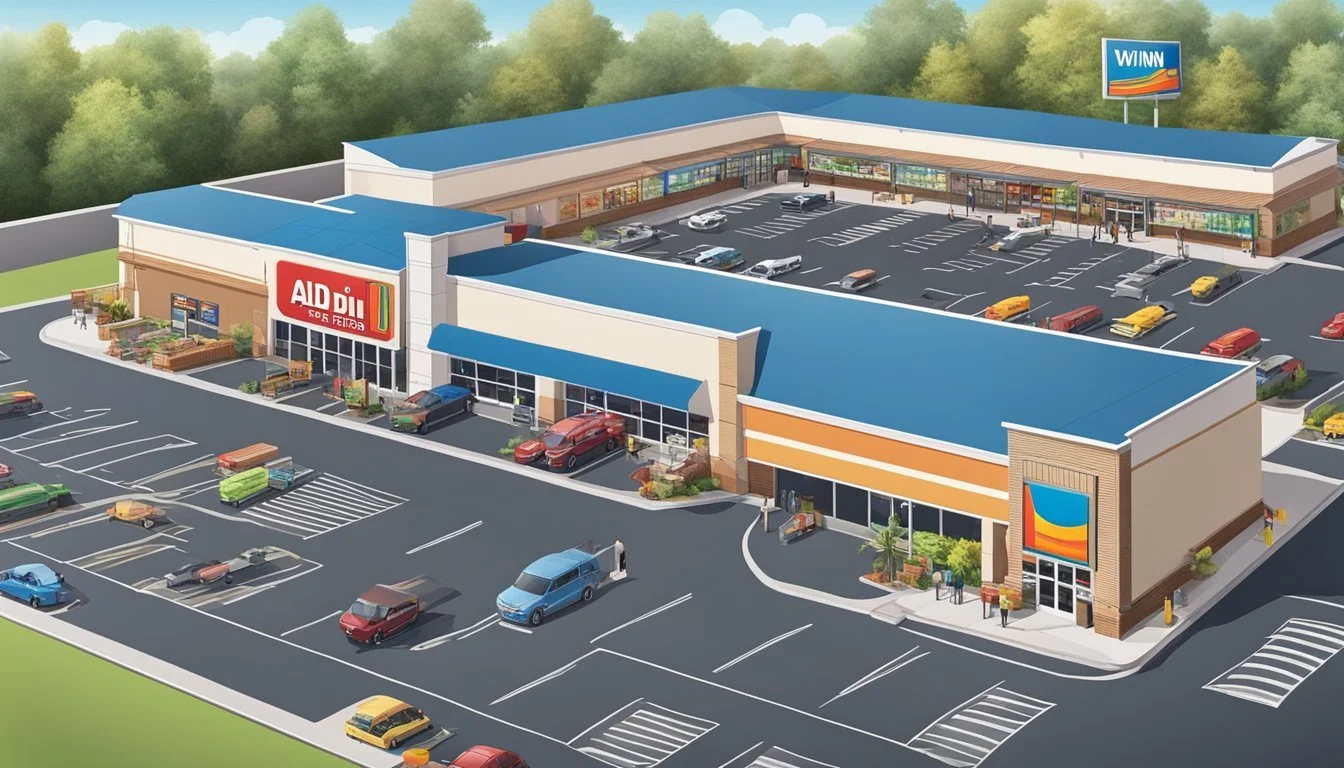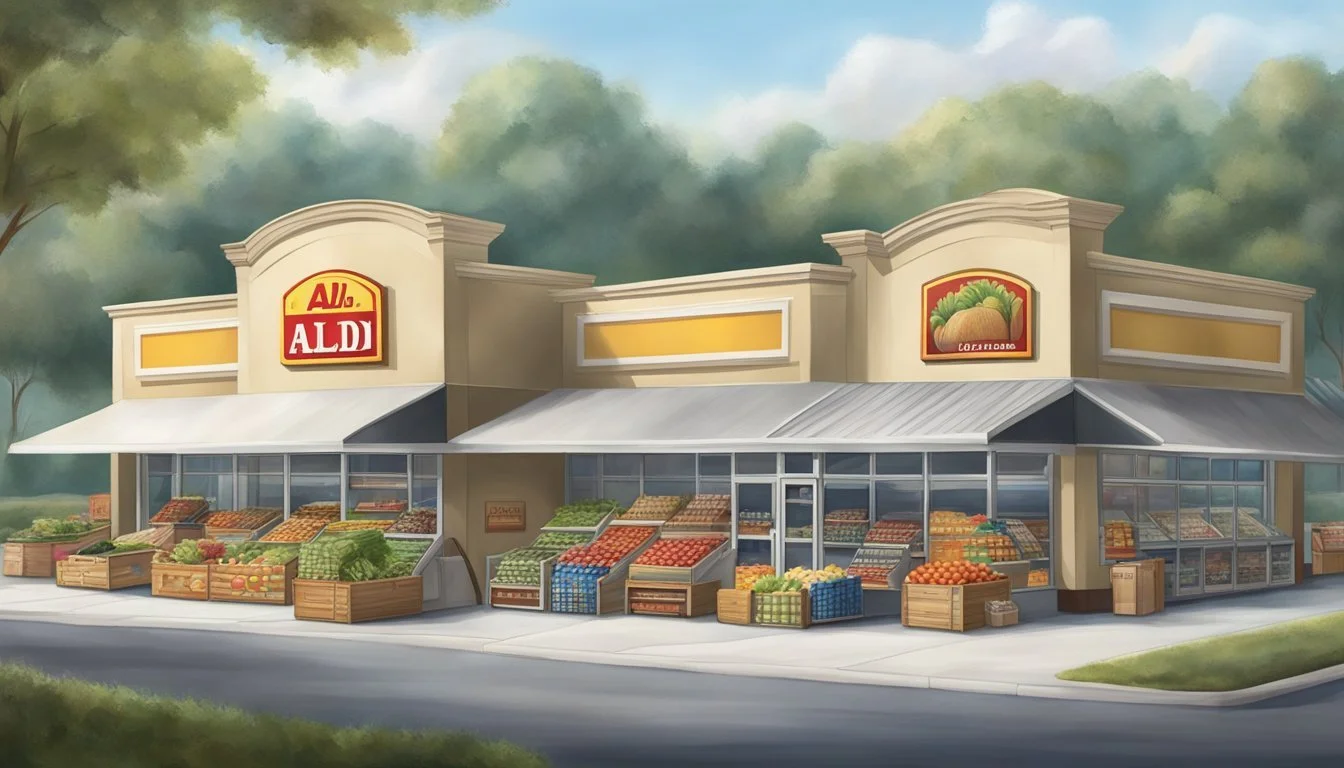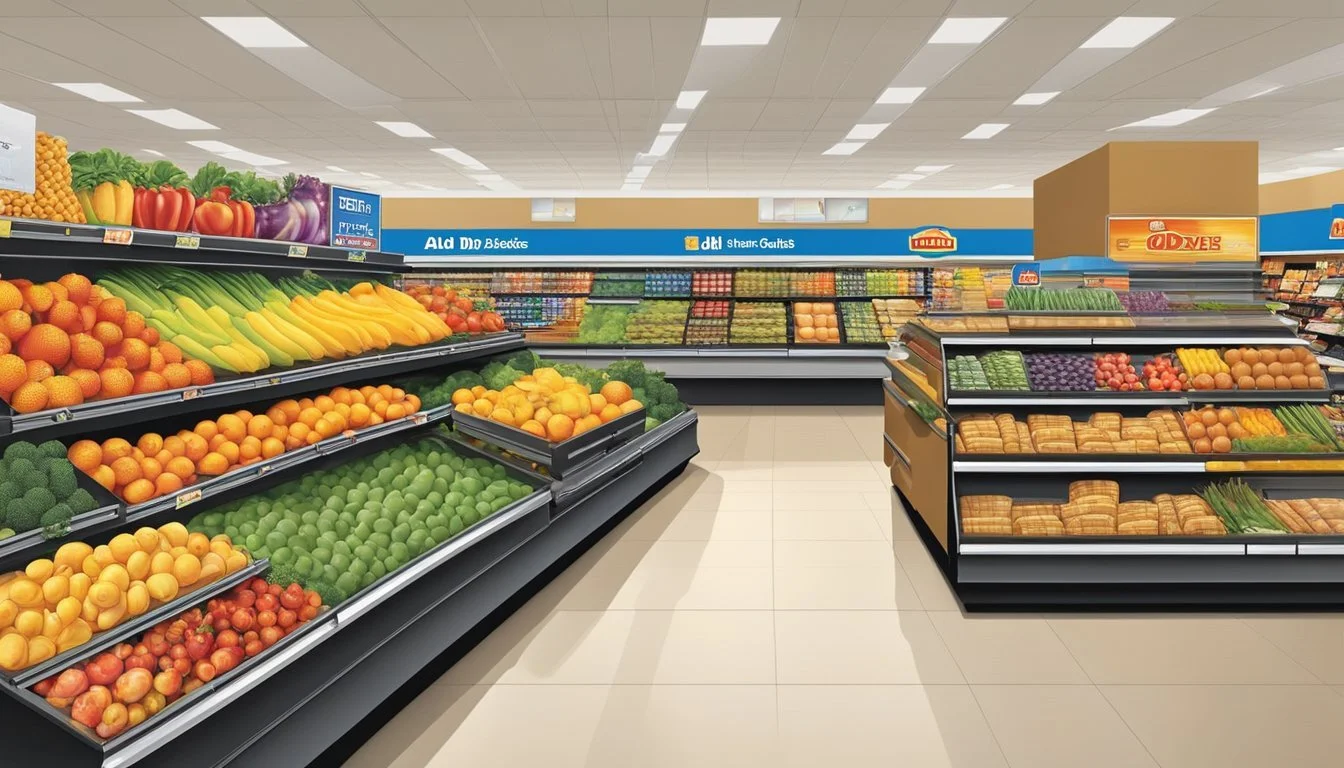Aldi vs Winn-Dixie
Comparing Prices, Quality, and Shopping Experience
Part of Our Grocery Store Guide with Details on Aldi and Winn-Dixie
When comparing Aldi and Winn-Dixie, shoppers often look for variety, affordability, and convenience. Aldi, a German discount supermarket chain known for its low prices and efficient shopping experience, operates over 2,800 stores across 38 states and Washington D.C. Its no-frills approach emphasizes quality own-brand products, minimalistic store layouts, and a smaller retail footprint, which typically measures around 22,000 square feet per store.
Winn-Dixie, on the other hand, is a traditional supermarket chain with a larger average store size of around 48,000 square feet, offering a wide range of national brands alongside its own private label products. Strategically based in Jacksonville, Florida, Winn-Dixie has been a familiar name in the grocery sector for decades. The store experience is more conventional with a broader product selection, but it is also perceived as generally more expensive than Aldi.
The recent acquisition of Winn-Dixie by Aldi has stirred up the grocery retail landscape. This strategic move may significantly alter how the two brands operate and compete in the market. Both Aldi's expansion plans and Winn-Dixie's strong regional presence raise questions about value, quality, customer experience, and the future of grocery shopping in an increasingly competitive industry.
Background and History
As two major forces in the grocery sector, Aldi and Winn-Dixie have rich histories that have shaped their current market positions. Each has developed a distinct presence in the supermarket landscape, with Aldi taking a global stance as a cost-effective discounter, and Winn-Dixie establishing deep roots in the Southeastern United States.
Aldi: From German Roots to Global Discounter
Aldi, short for Albrecht Discount, was founded by the Albrecht family in Germany in the early 20th century. Initially a small grocery store, Aldi expanded rapidly post-World War II, embodying the discounter model that focuses on low prices and unmatched efficiency. Aldi operates on a unique model that emphasizes:
Simplified store layouts
A focused range of private label items
No-frills customer experience
Aldi's growth propelled it beyond Germany's borders, transforming it into a global chain with thousands of locations worldwide. Their cost-saving practices have often disrupted traditional grocery markets by offering quality goods at lower prices.
Winn-Dixie: A Staple in the Southeastern US
Winn-Dixie, once predominantly operated by Southeastern Grocers, has its origins in the heart of Florida and has been a recognizable name in the grocery industry since the 1920s. Winn-Dixie has prided itself on being a traditional, full-service supermarket, with a substantial presence in several Southeastern states, including Florida, Georgia, Louisiana, Mississippi, and Alabama. Key aspects of Winn-Dixie include:
Wide selection of products
Emphasis on customer service
Commitment to local communities
Despite facing financial challenges and market shifts, Winn-Dixie has been a go-to grocer for many in the Southeast, known for its tailored offerings catering to the tastes and preferences of the local populace.
Store Comparison
In comparing Aldi and Winn-Dixie, shoppers will find notable differences in store layout, product selection, and pricing strategies that cater to differing consumer preferences.
Store Layout and Design
Aldi's store layout is compact and efficiency-driven, typically covering 12,000 square feet, contrasting with Winn-Dixie's larger formats of 40,000 to 60,000 square feet. Aldi optimizes its space with a straightforward design that allows for quick shopping trips. Winn-Dixie stores often feature more elaborate designs with dedicated sections for baked goods, meat, and produce.
Product Selection and Brands
Both grocery stores offer a range of private-label brands and national brands, but their strategies differ significantly. Aldi is known for its predominantly store brand offerings, which account for the majority of its stock, catering to cost-conscious consumers. Winn-Dixie boasts a wider product selection, including a mix of private-label and national brands, and an extensive variety of dairy, produce, and meat products.
Pricing and Discounts
Pricing is one of the most critical factors for grocery shoppers. Aldi is recognized for its low prices and discounts, made possible by its no-frills model of retailing and strong emphasis on store brands. Winn-Dixie offers regular promotions and frequent shopper discounts, appealing to those who look for deals and savings on their favorite national and private-label brands.
Market Presence and Popularity
The unfolding narrative between Aldi and Winn-Dixie in the supermarket arena is one of strategic expansion and shifting customer loyalties, as these grocers pursue dominance within their regional strongholds and beyond.
Regional Influence and Expansion
Aldi, with its origins in Germany, has established a robust footprint in the United States with a significant presence in states such as Illinois. In contrast, Winn-Dixie has historically been a staple in the Southeast, notably in Florida, Georgia, Louisiana, Mississippi, and Alabama. Aldi's recent move to acquire Winn-Dixie suggests a strategic expansion that will increase its regional influence, particularly in the Southeast, positioning it as a direct competitor to Publix and Kroger.
Aldi: Prominently found in the Midwest and expanding into the Southeast.
Winn-Dixie: Traditionally a key player in the Southeastern markets.
Consumer Perception and Brand Awareness
When it comes to brand awareness, Aldi and Winn-Dixie encounter diverse consumer perceptions. Aldi, often lauded for its cost-efficiency, has been climbing in popularity and awareness, competing closely with other discount grocers such as Lidl, according to YouGov ratings. Winn-Dixie, while possessing strong brand recognition in the Southeast, now faces the challenge of revitalizing its image under Aldi's growing shadow.
Aldi: Known for affordability and increasing nationwide recognition.
Winn-Dixie: Facing a battle for relevancy amidst an evolving marketplace.
In the broader landscape, these supermarkets operate alongside giants like Walmart and Target, along with specialty stores like Whole Foods and Trader Joe's. With Amazon's entry into the brick-and-mortar space and the rise of specialty grocers like Sprouts Farmers Market, the competition remains intense.
Operational Strategies
This section examines the distinct approaches both Aldi and Winn-Dixie adopt in their operational strategies, emphasizing differences in business models, supply chain efficiency, and waste management practices.
Business Models and Strategies
Aldi operates as a discounter with a business model centered on simplified store layouts and a high percentage of private-label brands. It offers a limited selection of goods, focusing on staple items and weekly specials, which helps with inventory management and price reduction. Aldi stores usually have a smaller footprint compared to traditional supermarkets, which allows for reduced operational costs.
In contrast, Winn-Dixie takes on the role of a conventional supermarket, providing a wider array of brands and products, including national and regional labels. This variety caters to various consumer preferences but can lead to higher operational costs due to more complex inventory requirements.
Supply Chain and Waste Management
Aldi’s supply chain is designed for efficiency and cost-effectiveness. It employs a streamlined logistics model with a focus on minimizing waste — not only to reduce environmental impact but also to maintain low prices. The reduction of product handling and a strong relationship with suppliers allow Aldi to optimize stocking processes and minimize surplus.
Winn-Dixie’s approach involves a more traditional supermarket supply chain, which while robust, can be susceptible to greater levels of waste due to the broader product range and the complexity of managing perishable goods. Remarkably, both Aldi's acquisition of Winn-Dixie and Harveys Supermarket chains could mean an integration of Aldi's efficient practices into Winn-Dixie's supply chain, potentially improving waste management processes in the latter.
Customer Experience and Services
Customer experience and services at grocery stores like Aldi and Winn-Dixie are pivotal for maintaining customer loyalty and standing out in the competitive retail landscape. Each store offers a distinct approach to service, leveraging their unique brand philosophy to cater to their clientele.
In-Store Experience
Aldi stores are designed for efficiency, with a focus on providing a simple, uniformly laid-out shopping experience. The stores are typically around 22,000 square feet, which is less than half the size of an average Winn-Dixie at 48,000 square feet. Aldi’s smaller store size contributes to a more streamlined shopping environment. Throughout the pandemic, Aldi maintained a strong in-store experience by quickly adapting to health guidelines, ensuring customer and staff safety.
In contrast, Winn-Dixie offers a broader range of services and a more conventional supermarket experience. They provide wide aisles, a larger variety of products, and enhanced design elements aimed at creating a more inviting store atmosphere. They emphasize customer service and frequently have promotions to engage customers. Winn-Dixie’s larger store size allows for a greater expansion of services and a more personalized shopping experience.
Digital and E-Commerce Initiatives
Both Aldi and Winn-Dixie have embraced digital initiatives, particularly in the wake of the pandemic, which accelerated the adoption of e-commerce in the grocery store sector.
Aldi has been expanding its digital footprint, offering online shopping options in many locations, and partnering with third-party services for home delivery. Their digital strategy is consistent with their overall emphasis on simplicity and efficiency, providing customers with a no-frills online purchasing journey. Their website features a clean design and offers exclusive store brands that are affordable and easy to find.
Winn-Dixie has also invested in their digital and e-commerce platforms to provide a seamless shopping experience from in-store to online. They have cultivated an online presence that includes a robust website and mobile app, offering features such as digital coupons, loyalty programs, and online ordering with options for delivery or curbside pickup. Their digital initiatives reflect their commitment to accessibility and catering to a digitally savvy customer base.





